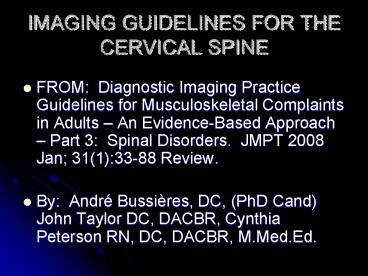IMAGING GUIDELINES FOR THE CERVICAL SPINE - PowerPoint PPT Presentation
1 / 26
Title:
IMAGING GUIDELINES FOR THE CERVICAL SPINE
Description:
By: Andr Bussi res, DC, (PhD Cand) John Taylor DC, DACBR, Cynthia Peterson RN, ... It has not been relieved by Physiotherapy. There are no associated Symptoms ... – PowerPoint PPT presentation
Number of Views:78
Avg rating:3.0/5.0
Title: IMAGING GUIDELINES FOR THE CERVICAL SPINE
1
IMAGING GUIDELINES FOR THE CERVICAL SPINE
- FROM Diagnostic Imaging Practice Guidelines for
Musculoskeletal Complaints in Adults An
Evidence-Based Approach Part 3 Spinal
Disorders. JMPT 2008 Jan 31(1)33-88 Review. - By André Bussières, DC, (PhD Cand) John Taylor
DC, DACBR, Cynthia Peterson RN, DC, DACBR,
M.Med.Ed.
2
Guidelines are not absolute RULES
- TRAUMATIC (Acute)
- Apply Canadian C-spine Rules
- Use Clinical judgment
- Conventional radiographs are unlikely to show
clinically significant injuries when all Canadian
Cervical Spine Rule criteria are fulfilled.
- NON-TRAUMATIC
- Apply Red flags
- Use Clinical judgment
3
Canadian Cervical Spine Rules
4
Dangerous Mechanism of Injury
- Fall gt 1 meter/5 stairs
- Axial cranial force (such as diving)
- Road accident gt 100 km/hr, ejected from vehicle
or rollover - Motorized recreational vehicle (ATT, snowmobile,
etc)
5
Must do 3 views AP lower cervical, AP open
mouth upper cervical, neutral lateral cervical.
DO NOT DO FLEXION/EXTENSION
6
Young adult male presented to Dutch DC after a
fall from the roof. These hospital films were
read as normal.
7
(No Transcript)
8
After 3 view series analyzed..
- CT is best for evaluating fractures.
- MRI is best for neurological deficits.
- CT is primary investigation for high risk
patients on an emergency basis.
9
Non-significant injuries may rarely be missed
when the CCSR is properly applied
- Spinous process fracture
- Transverse process fracture
- However, these are significant for manual
therapy. - Thus apply Clinical Decision making.
10
Adult male with acute onset of neck pain after MVA
Immediate post-trauma
Immediate post-adjustment
11
(No Transcript)
12
Adult Patient with Acute Uncomplicated Neck Pain
(lt 4 wks duration)
- Uncomplicated non-traumatic neck pain without
underlying neurologic deficits or red flags
- Radiographs not routinely indicated
- Special Investigations not indicated
13
Adult pt. with non-traumatic neck pain and
radicular symptoms
- Suspected acute cervical disc herniation
- Suspected acute cervical spondylotic radicular
syndrome/lateral canal stenosis - (Rare tumours causing neuro compression)
- Radiographs indicated
- AP lower cervical
- AP open mouth
- Lateral
- (rarely obliques)
14
Adult pt. with uncomplicated subacute neck pain
(4-12 wks duration) with or without arm pain as
well as pts with persistent neck pain (gt12 wks)
with or without arm pain
- Radiographs not initially indicated (Bone and
Joint Decade 2000-2010 task force on neck pain
and its associated disorders) - If done
- AP lower cervical
- AP open mouth
- Lateral
15
Adult pt. re-evaluation in the absence of
expected treatment response or worsening after 4
wks
- Radiographs indicated
- AP lower cervical
- AP open mouth
- Lateral
- Co-management or specialist referral or MRI
recommended even if conventional radiographs are
unremarkable.
16
Adult patient with Red Flags
- Pt lt age 20 or gt age 50 (65), particularly with
S/S suggesting systemic disease - No response to care after 4 weeks
- Significant activity restriction gt 4 wks
- Non-mechanical pain (unrelenting pain at rest,
constant or progressive SS. - Neck rigidity in the sagittal plane in the
absence of trauma - Dysphasia
- Impaired consciousness
- Radiographs indicated
- 3 view minimal series
- May need referral for MRI or CT
17
Red Flags continued
- CNS SS (cranial nerves, path reflexes, long
tract signs) - High risk ligamentous laxity populations
- Arm or leg pain with neck movement
- Suspected cervical myelopathy and
radiculomyelopathy - Suspected neoplasia
- Suspected infection
- Positive laboratory examination and SS
- Sudden onset of acute and unusual neck pain
and/or headache with or without neurological
symptoms
- Radiographs indicated
- 3 view minimal series
- Flexion lateral view added
- Check ADI
- Radiographs indicated
- 3 view minimal series
- Immediate referral without plain films for
advanced imaging.
18
56 year old female presented to her English
chiropractor in 1999 with insidious onset of neck
pain.It has not been relieved by
Physiotherapy.There are no associated
SymptomsH/O Breast cancer in 1984.
19
(No Transcript)
20
(No Transcript)
21
(No Transcript)
22
Negative Radiographs do not necessarily clear
the patient when certain Red Flags are present
- History of Malignancy is one of these situations
23
Middle-aged female presented to her DC in Wales
with recent onset of headaches and dizziness.
24
(No Transcript)
25
(No Transcript)
26
Thank you for your attention































